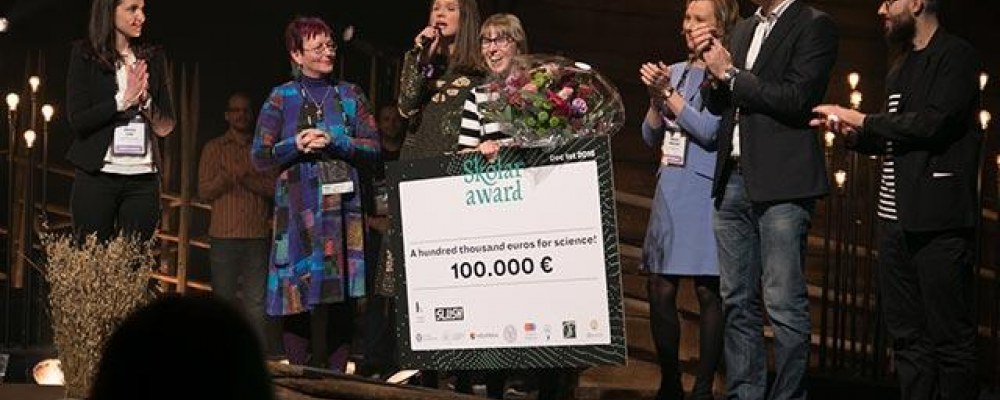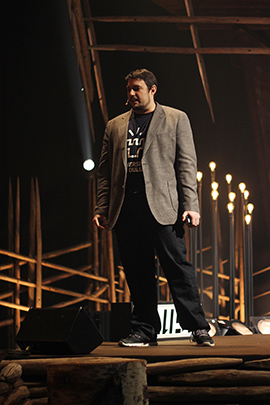
Pitching research resulted in contacts at Slush
In addition to the winner, other researchers were also satisfied with the researcher pitching organised at Slush. The competition brought more extensive attention to science.
– This is amazing. This kind of thing just doesn’t happen to me. This is something that happens to other people, says Virpi Virjamo with a EUR 100,000 cheque.
Virjamo is a plant ecology scholar at the University of Eastern Finland, who under less than an hour earlier gave a pitch on the opportunities provided by Finnish coniferous forests as ingredients for new types of antibiotics before the jury. The idea of the Skolar Awards competition is to give a research grant to one promising research idea and offer visibility to others.
Virjamo’s enthusiasm can be felt in the audience. A woman who has been focusing closely on working on her laptop in the front row of the pitching contest awakens at Virjamo’s joy and goes to take a picture. Rarely does science get noticeable appreciation and enthusiasm at Slush.
Virjamo promises to use the money for finding novel antibiotics, thereby combatting antibiotic-resistant superbacteria.
Three-minute funding application

On Monday, the light show and interest by thousands at Slush have changed to everyday office work. Post-Doctoral Research Scientist Miguel Bordallo answers the phone in his study at the University of Oulu.
– Could you call me on my mobile phone? This phone is so bad I have trouble hearing.
The interview goes without problems on mobile phone. Bordallo tells us that he is very happy with the experience at Slush.
– It was also somewhat scary with 2,000–3,000 people interested in science in the audience.
With the contest, Bordallo sought funding for research work to make glasses with a camera and built-in intelligence for doctors. In his three-minute pitch, Bordallo said that it has been proven in laboratory conditions that a camera can identify 30 different diseases based on a patient’s face. Bordallo wants to get the technology to be used at hospitals and medical clinics.
He praised the concept of the contest.
– Three minutes forces you to condense the purpose of the research work. During that time, people will not get bored. Often, research conducted at universities is difficult to perceive. Now, the majority of people understand what it actually is that I am researching.
Bordallo says that many people came to talk with him about cooperation possibilities in research at Slush. There have been continued contacts from Finland and the Nordic countries also after Slush.
The Slush experience and the numerous contacts increased Bordallo’s motivation. However, that is not enough as such.
Bordallo says that money is their biggest problem with research. Slush did not offer a solution to that problem, as no promising investors have appeared yet.
Not just new applications
At times, it felt during Slush that the business idea of some startups could be summarised as “again a new application”. Science pitching and especially the Impact pitching contest following it, on the other hand, represented a bigger meaning.
Impact startup is a word pair that could also be called “world improvement startups”. The business idea of these startups is to solve major global problems.
At Slush, for example, Riego and Gri Apps aimed to help farmers to reduce water consumption with sensors and a system that learns. Izyshop brought small farmers’ products to the market via a web shop, thereby increasing their income. Kgoshigadi had created ecological sanitary pads and a networked business model. This way, local communities can produce sanitary pads and sell them, simultaneously enhancing the lives of local women without burdening the environment.
In the Impact pitching, Teledoctor from Zambia offering medical consultation services to everyone, Kgoshigadi from South Africa and Izyshop from Mozambique were awarded with a place in pharmaceutical company Bayer’s company incubator.
There were no Finnish startups in the competition final.